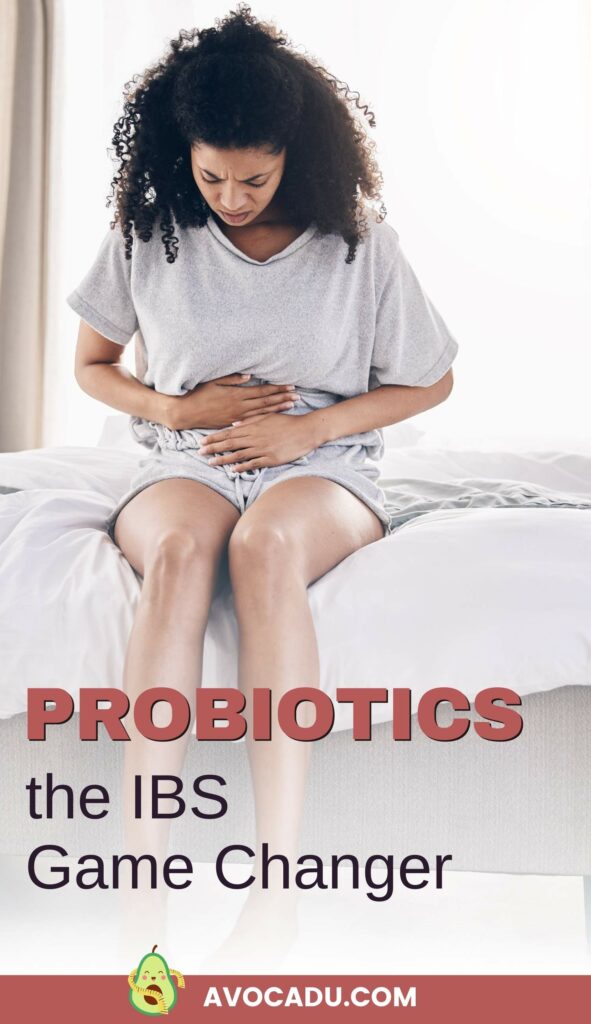Probiotics for Digestive Disorders: Relief for Irritable Bowel Syndrome (IBS)
If your tummy has been throwing tantrums lately, you might find solace in knowing that you’re not alone. Many folks face the tricky rascal known as Irritable Bowel Syndrome (IBS).
Thankfully, we’ve got a secret weapon – probiotics for digestive disorders. We’re here to chat about how these friendly bacteria might be the BFFs your gut needs!
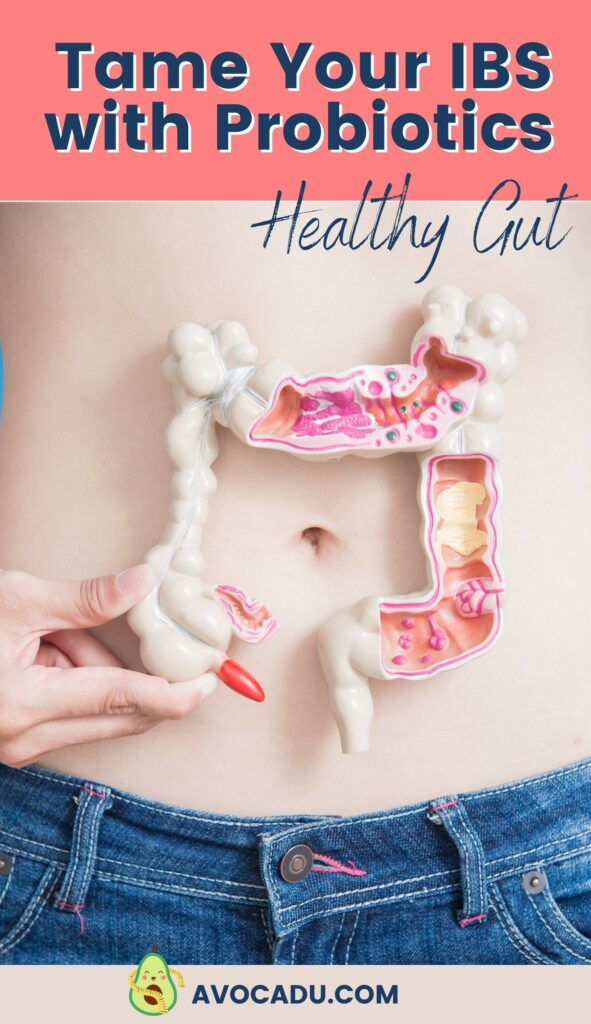
This post may contain affiliate links, which helps keep this content free. Please read our disclosure for more info.
Understanding Probiotics
First off, what are probiotics? Imagine your gut as a bustling, vibrant city. The citizens? They’re microorganisms. And in this city, probiotics are your friendly, helpful neighbors.
Probiotics are living microorganisms, mostly made up of bacteria, but also include yeast species. Now, if you’re wrinkling your nose at the mention of ‘bacteria,’ don’t worry!
These aren’t the kind that make you sick. On the contrary, they are beneficent buddies, and when you have them in just the right amounts, they are ready to offer various health benefits.
These benefits extend from enhancing your digestion to strengthening your immune system, and even contributing to your mental wellbeing. Essentially, they maintain the equilibrium of your gut city, ensuring everything operates smoothly.
But where can you find these friendly neighbors? Well, they love hanging out at the trendy spots of the culinary world – fermented foods.
This includes a wide range of items like yogurt, kefir, sauerkraut, kimchi, tempeh, and kombucha. Consuming these foods is like attending a social gathering filled with probiotics.
Yogurt and kefir, for instance, are milk products fermented by lactic acid bacteria and bifidobacteria. They’re not just creamy and delicious; they also serve as excellent sources of probiotics.
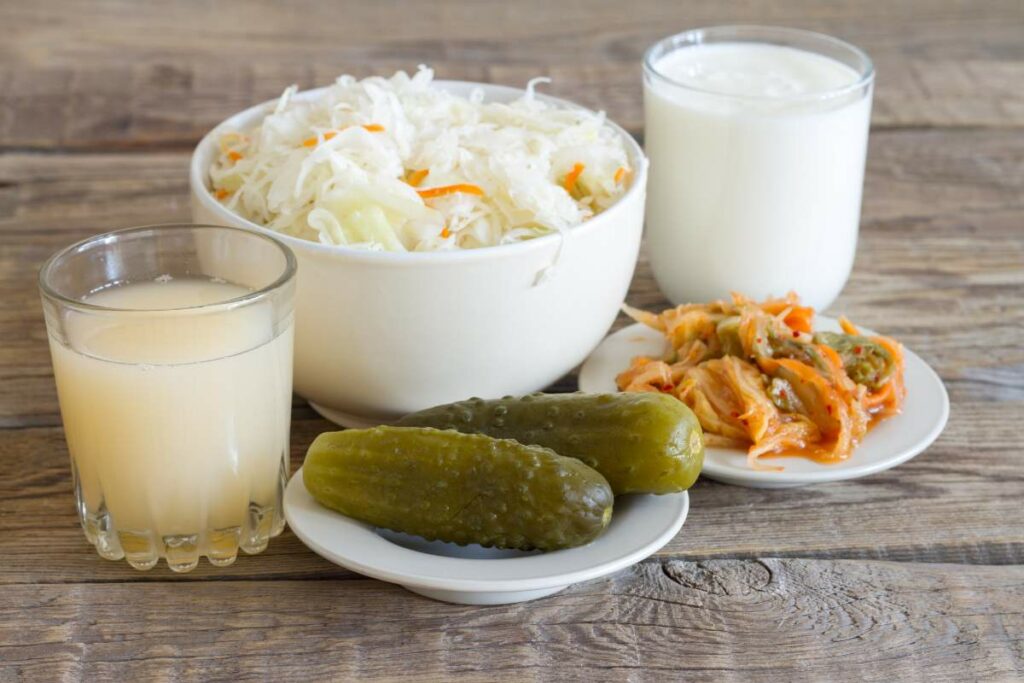
Sauerkraut and kimchi, on the other hand, are fermented cabbage teeming with these helpful microbes, adding a tangy twist to your meals.
And let’s not forget about the probiotic supplements, which are another option to help populate your gut city with these beneficial microbes, especially if fermented foods aren’t quite your cup of tea.
The key is balance and diversity in this gut city. A variety of probiotics can help ensure a wider range of health benefits, as each strain of bacteria has its unique role to play.
So, it’s a good idea to mix things up and invite all sorts of probiotic pals to your gut community!
PROBIOTIC
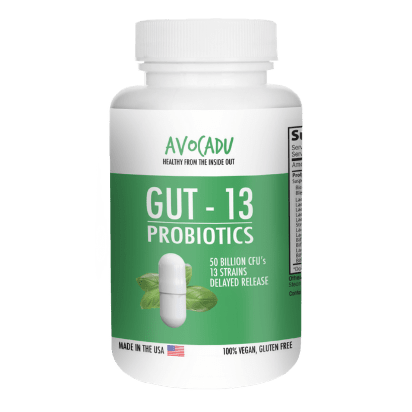
Avocadu’s Gut-13 Probiotics
In a recent study, women taking probiotics lost 50% more weight than those who did not. Your gut health and how well you absorb nutrients MATTERS. Don’t miss out on getting in a daily probiotic. Click here.
The Science behind Probiotics and IBS
Picture your gut as a lively, bustling garden party. The guests at this party are an astonishing variety of microorganisms, including bacteria, viruses, and fungi, that collectively make up what we call the gut microbiota.
This party is a carefully orchestrated event where each guest plays a role in keeping the gut ecosystem vibrant and healthy.
But what happens when some unwelcome guests crash the party, or the dance floor gets a little too wild? That’s where things like Irritable Bowel Syndrome (IBS) come in, throwing the gut ecosystem off balance.
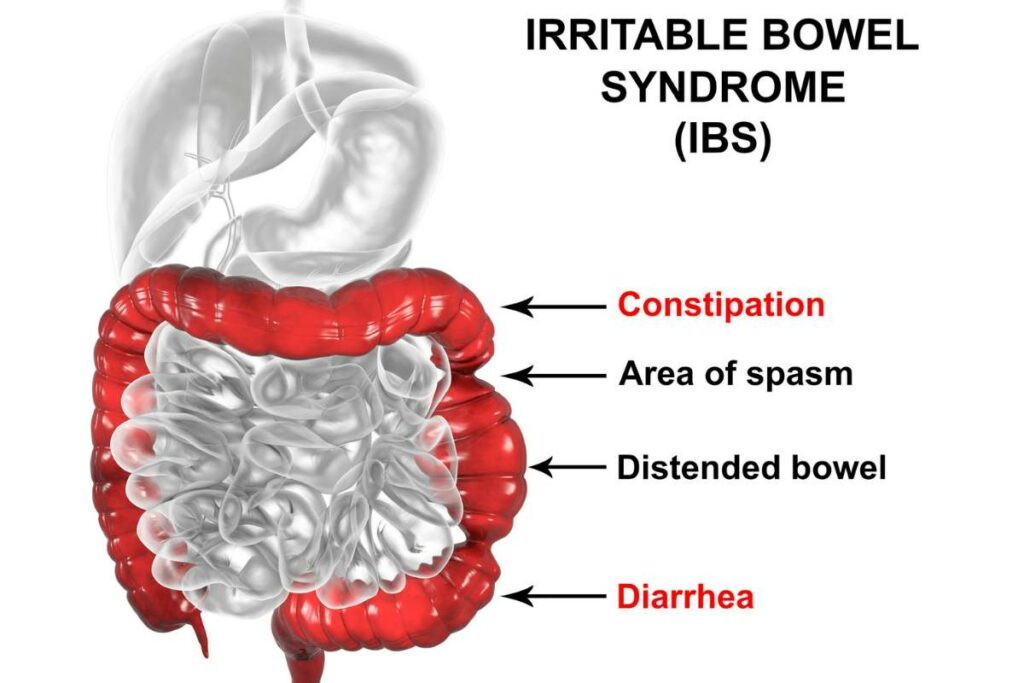
IBS can cause uncomfortable symptoms such as bloating, abdominal pain, and irregular bowel movements that can disrupt your daily life.
Here’s where our peacekeepers, the probiotics, strut onto the scene. Acting as mediators, they help maintain harmony among the diverse array of guests at the gut party.
They ensure the party vibes remain cool, calm, and balanced by encouraging beneficial bacteria and showing the door to the uninvited guests.
Probiotics also perform other remarkable feats, like strengthening the immune system – think of it as the party’s security detail.
They help fight off the party crashers, those harmful pathogens, ensuring your gut remains a safe and happy place for the beneficial bacteria.
On top of this, probiotics play a pivotal role in digestion. They assist in breaking down food, enhancing nutrient absorption, and promoting regular bowel movements.
In other words, they make sure the food at the party is well managed.
Research has consistently pointed to a connection between a disrupted gut microbiota and IBS. When the gut party gets too wild, and harmony gives way to chaos, it can result in the uncomfortable symptoms associated with IBS.
Probiotics for digestive disorders, including IBS, can help restore this balance. By promoting a healthy diversity of gut bacteria, probiotics can alleviate symptoms of IBS and ensure that your gut party remains a joyous, well-balanced affair.
Related Article: 10 Warning Signs You Have an Unhealthy Gut + What to Do About It
Benefits of Probiotics for IBS

You’re probably thinking, “Okay, so these probiotics sound like they’re on our side, but how exactly are they helping my IBS?”
Well, that’s a great question, and the good news is that these microscopic allies pack a pretty powerful punch.
First off, probiotics can give a firm ‘no thank you’ to bloating and gas, two uninvited guests often seen at the IBS party.
By balancing out your gut’s guest list (that is, your gut flora), probiotics help keep gas production in check, meaning less bloating and discomfort for you.
Now, let’s talk about pain – those tough abdominal cramps that IBS can dish out. Probiotics can step up to the plate here, too.
They have a knack for interacting with your gut nerves that control muscle contractions, helping turn down the volume on abdominal pain.
But the perks of teaming up with probiotics don’t stop there. They’re also all about keeping your digestive system running smoothly. Think better nutrient absorption and more regular trips to the restroom, helping your gut health stay on track.
The best part? These benefits aren’t just a one-time deal. With regular probiotics use, you can keep these bonuses around, kind of like a wellness subscription for your gut.
Studies and clinical trials back this up, showing that probiotics can be a valuable partner in managing IBS symptoms over the long term.
Choosing the Right Probiotic for IBS
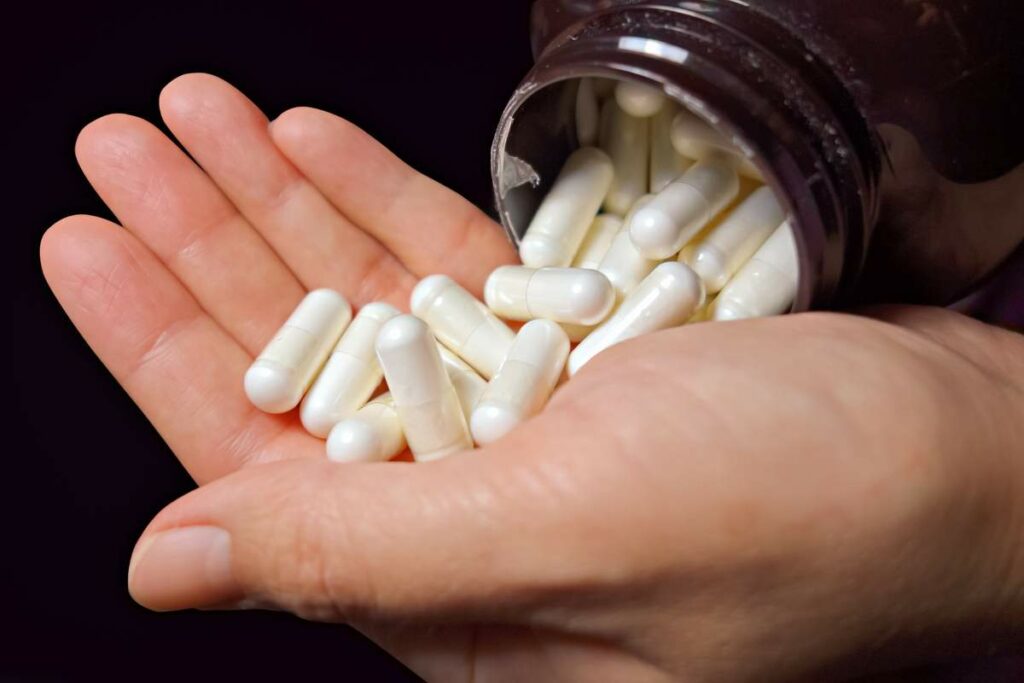
Choosing a probiotic isn’t as straightforward as grabbing the first one you see. It’s more like a meticulous shopping trip. Not all probiotics are created equal, especially when it comes to IBS.
Different strains of probiotics like Bifidobacterium and Lactobacillus have shown positive results in alleviating IBS symptoms, so it pays to know your strains.
Checking the CFUs
Colony Forming Units (CFUs) are the next thing to consider. This number tells you the amount of live microbes in a probiotic supplement.
It’s tempting to think that a higher CFU count is automatically better, but that’s not always the case. It’s not a matter of more being better, but finding the dose that suits you best.
Quality and Brand Matter
Choosing a reputable brand is also crucial when picking a probiotic. Just as you’d go for trustworthy brands when shopping for clothes, the same applies here. Check for quality assurance to ensure you’re getting a product that can deliver what it promises.
Tailoring to Your Body’s Needs
Personal preferences come into play, too. Everybody is unique, and a probiotic that works wonders for someone else might not sit well with you.
If a particular probiotic doesn’t agree with your system, don’t hesitate to explore other options until you find one that’s a good match.
Consult a Healthcare Professional
And of course, don’t underestimate the value of professional advice. Consulting with a healthcare professional can provide valuable insights and help you find the probiotic that fits your specific needs.
Just as a stylist can help you find the perfect outfit, a healthcare professional can help guide you to the most effective probiotic for your IBS.
Incorporating Probiotics into Your Diet
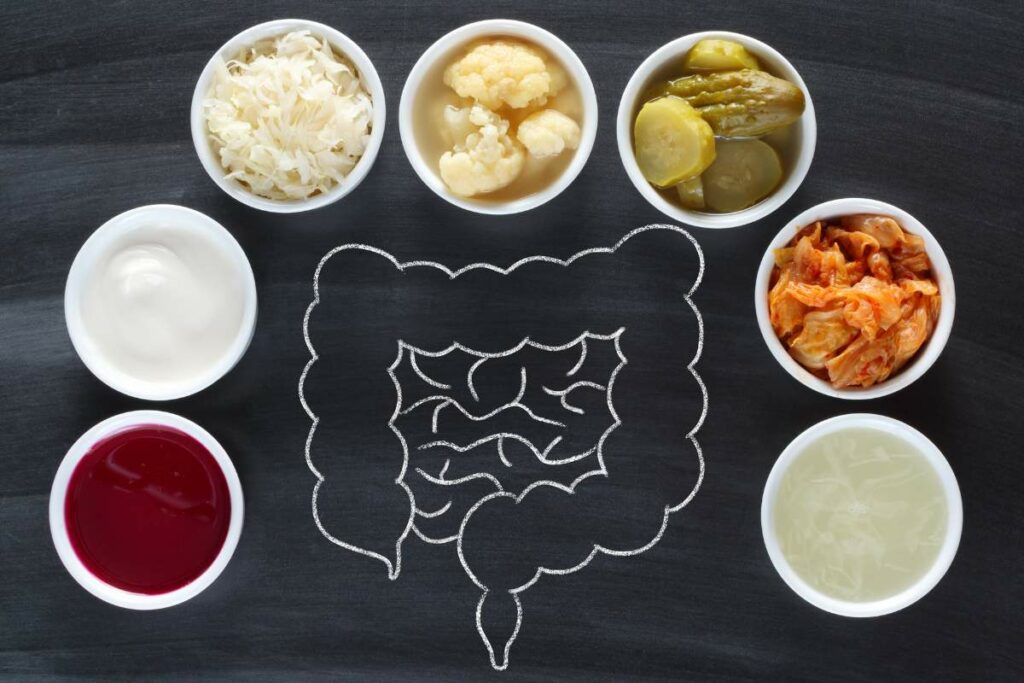
Probiotic supplements are a great way to get these beneficial microbes into your system, but they’re not the only way. You can also extend an invite to these friendly gut guests through your diet.
Probiotic-Rich Foods
There are several foods rich in probiotics that you can easily add to your diet.
Yogurt is a popular choice; it’s like the life of the party when it comes to probiotic foods. It’s packed with beneficial strains of bacteria like Lactobacillus and Bifidobacterium, which can be great for your gut health.
Another great option is kefir, a fermented dairy product similar to yogurt but typically contains a wider variety of probiotic strains.
Fermented Foods
Fermented foods are another way to add probiotics into your diet. Miso, a Japanese seasoning made by fermenting soybeans, is full of good bacteria. It’s easy to incorporate into your diet through soups and dressings.
And then there’s sauerkraut, or fermented cabbage, a tasty and tangy food loaded with probiotics. It can be a nice addition to your sandwiches or as a side dish.
Balancing Your Diet

While adding these foods into your diet can be beneficial, it’s also important to maintain a balanced diet overall. After all, even the best parties need a variety of guests to keep things interesting and run smoothly.
So, alongside these probiotic-rich foods, ensure you’re getting plenty of fiber, staying hydrated, and incorporating a variety of nutrients to support your overall health and the health of your gut.
Incorporating probiotics into your diet doesn’t have to be complicated or boring. By adding these foods into your meals, you’re not only treating your taste buds but also packing a probiotic punch for your gut health!
Bringing It All Together: Probiotics for Digestive Disorders and Introducing Gut-13

It’s clear that probiotics for digestive disorders are like the unsung heroes of gut health.
Living with IBS can often feel like you’re on a constant search for relief, much like hunting for that perfect dress that just fits right or that date that feels like they’ve been tailored to you.
Probiotics can be that perfect fit, helping to alleviate some of the discomforts associated with IBS, like bloating, gas, and abdominal pain.
But here’s where the search for that ‘perfect fit’ comes in – choosing the right probiotic supplement.
Just as you would take your time choosing a dress or deciding on a date, it’s crucial to put some thought into picking a probiotic supplement. Remember, quality, strain, CFUs, and your body’s personal response all come into play.
If you’re feeling overwhelmed with the options out there, let us make a suggestion: Gut-13, Avocadu’s Premium Probiotic.
PROBIOTIC

Avocadu’s Gut-13 Probiotics
In a recent study, women taking probiotics lost 50% more weight than those who did not. Your gut health and how well you absorb nutrients MATTERS. Don’t miss out on getting in a daily probiotic. Click here.
This product has been designed with your gut health in mind, containing a variety of strains, including the Bifidobacterium and Lactobacillus strains we mentioned earlier.
And with quality assurance you can trust, Gut-13 may just be the ally your gut has been waiting for.
Probiotics are key players in maintaining and restoring gut health, especially for those living with IBS. So whether you choose to incorporate more probiotic-rich foods into your diet or opt for a supplement like Gut-13, remember – your gut is worth the investment. Here’s to your health!
